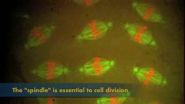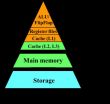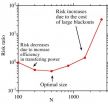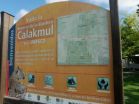(Press-News.org) Humans are unique in their ability to acquire language. But how? A new study published in the Proceeding of the National Academy of Sciences shows that we are in fact born with the basic fundamental knowledge of language, thus shedding light on the age-old linguistic "nature vs. nurture" debate.
THE STUDY
While languages differ from each other in many ways, certain aspects appear to be shared across languages. These aspects might stem from linguistic principles that are active in all human brains. A natural question then arises: are infants born with knowledge of how the human words might sound like? Are infants biased to consider certain sound sequences as more word-like than others? "The results of this new study suggest that, the sound patterns of human languages are the product of an inborn biological instinct, very much like birdsong" said Prof. Iris Berent of Northeastern University in Boston, who co-authored the study with a research team from the International School of Advanced Studies in Italy, headed by Dr. Jacques Mehler. The study's first author is Dr. David Gómez.
BLA, ShBA, LBA
Consider, for instance, the sound-combinations that occur at the beginning of words. While many languages have words that begin by bl (e.g., blando in Italian, blink in English, and blusa in Spanish), few languages have words that begin with lb. Russian is such a language (e.g., lbu, a word related to lob, "forehead"), but even in Russian such words are extremely rare and outnumbered by words starting with bl. Linguists have suggested that such patterns occur because human brains are biased to favor syllables such as bla over lba. In line with this possibility, past experimental research from Dr. Berent's lab has shown that adult speakers display such preferences, even if their native language has no words resembling either bla or lba. But where does this knowledge stem from? Is it due to some universal linguistic principle, or to adults' lifelong experience with listening and producing their native language?
THE EXPERIMENT
These questions motivated our team to look carefully at how young babies perceive different types of words. We used near-infrared spectroscopy, a silent and non-invasive technique that tells us how the oxygenation of the brain cortex (those very first centimeters of gray matter just below the scalp) changes in time, to look at the brain reactions of Italian newborn babies when listening to good and bad word candidates as described above (e.g., blif, lbif).
Working with Italian newborn infants and their families, we observed that newborns react differently to good and bad word candidates, similar to what adults do. Young infants have not learned any words yet, they do not even babble yet, and still they share with us a sense of how words should sound. This finding shows that we are born with the basic, foundational knowledge about the sound pattern of human languages.
It is hard to imagine how differently languages would sound if humans did not share such type of knowledge. We are fortunate that we do, and so our babies can come to the world with the certainty that they will readily recognize the sound patterns of words--no matter the language they will grow up with.
INFORMATION:
Article title: Language universals at birth
Authors: David M. Gómez, Iris Berent, Silvia Benavides-Varela, Ricardo Bion, Luigi Cattarossi, Marina Nespor, & Jacques Mehler
The research leading to these results has received funding from the European Research Council under the European Union's Seventh Framework Programme (FP7/2007-2013) / ERC grant agreement n° 269502 (PASCAL) to Jacques Mehler.
Language structure… you're born with it
2014-04-08
ELSE PRESS RELEASES FROM THIS DATE:
Advanced warning systems increase safety at intersections, study shows
2014-04-08
Most drivers have experienced a traffic signal that turns yellow just as they approach an intersection, which makes it difficult for them to decide whether to stop or proceed through it. The wrong choice in this situation, known as the "dilemma zone," may lead to crashes, especially at high-speed intersections.
A major factor making driving difficult is hazards that are sudden and hard to predict. Roadside and in-vehicle display warning systems may help drivers handle these hazards by predicting their occurrence and providing advanced warning to the driver, according ...
Lipid levels during prenatal brain development impact autism: York U study
2014-04-08
In a groundbreaking York University study, researchers have found that abnormal levels of lipid molecules in the brain can affect the interaction between two key neural pathways in early prenatal brain development, which can trigger autism. And, environmental causes such as exposure to chemicals in some cosmetics and common over-the-counter medication can affect the levels of these lipids, according to the researchers.
"We have found that the abnormal level of a lipid molecule called Prostaglandin E2 in the brain can affect the function of Wnt proteins. It is important ...
Kinesin-5 structure opens cancer drug targets
2014-04-08
VIDEO:
Kinesin-5 plays a crucial role in cell division by allow microfilaments to slide past each other. The kinesin-5 structure shows a central rod connecting two motor units that walk along...
Click here for more information.
The structure of a key part of the machinery that allows cells to divide has been identified by researchers at the University of California, Davis -- opening new possibilities for throwing a wrench in the machine and blocking runaway cell division in cancer.
"The ...
Phase II trial of efatutazone shows challenge of matching treatment to population
2014-04-08
Work at the University of Colorado Cancer Center led to phase II trial of efatutazone with erlotinib in patients with refractory non-small cell lung cancer. Results are reported today at the American Association for Cancer Research (AACR) Annual Meeting 2014. While efatutazone did not improve the efficacy of erlotinib in this trial, researchers hope lessons from the trial will allow them to make better future use of the drug or other drugs in its class.
"In oncology and especially in lung cancer, everything is personalized. We're exploring different molecular markers ...
Glucosamine promotes longevity by mimicking a low-carb diet
2014-04-08
Glucosamine has been freely available in drugstores for many decades. It is widely used to treat arthritis and to prevent joint degeneration. Moreover, glucosamine is known to delay cancer growth. In addition, glucosamine reduces metabolism of nutritive sugars, as was already shown some 50 years ago.
In 2007, Michael Ristow showed that too much nutritive sugar shortens the lifespan of roundworms, a widely studied model organism in ageing research. Conversely, impairing carbohydrate metabolism in these worms was capable of extending lifespan [reference 1]. Unfortunately, ...
Future computers that are 'normally off'
2014-04-08
WASHINGTON D.C., April 8, 2014 -- If a research team in Japan gets its wish, "normally off" computers may one day soon be replacing present computers in a move that would both eliminate volatile memory, which requires power to maintain stored data, and reduce the gigantic energy losses associated with it.
Most parts of present computers are made with volatile devices such as transistors and dynamic random access memory (DRAM), which loses information when powered off. So computers are designed on the premise that power is "normally on."
Back in 2000, the concept of ...
Is the power grid too big?
2014-04-08
WASHINGTON D.C., April 8, 2014 -- Some 90 years ago, British polymath J.B.S. Haldane proposed that for every animal there is an optimal size -- one which allows it to make best use of its environment and the physical laws that govern its activities, whether hiding, hunting, hoofing or hibernating. Today, three researchers are asking whether there is a "right" size for another type of huge beast: the U.S. power grid.
David Newman, a physicist at the University of Alaska, believes that smaller grids would reduce the likelihood of severe outages, such as the 2003 Northeast ...
Rice U. study: Creativity and innovation need to talk more
2014-04-08
HOUSTON – (April 8, 2014) – Creativity and innovation are not sufficiently integrated in either the business world or academic research, according to a new study by Rice University, the University of Edinburgh and Brunel University.
The findings are the result of the authors' review of the rapidly growing body of research into creativity and innovation in the workplace, with particular attention to the period from 2002 to 2013.
"There are many of us who study employee creativity and many of us who study innovation and idea implementation, but we don't talk to each ...
The surprising truth about obsessive-compulsive thinking
2014-04-08
Montreal, April 8, 2014 — People who check whether their hands are clean or imagine their house might be on fire are not alone. New research from Concordia University and 15 other universities worldwide shows that 94 per cent of people experience unwanted, intrusive thoughts, images and/or impulses.
The international study, which was co-authored by Concordia psychology professor Adam Radomsky and published in the Journal of Obsessive-Compulsive and Related Disorders, examined people on six continents.
Radomsky and his colleagues found that the thoughts, images and ...
Where credit is due: How acknowledging expertise can help conservation efforts
2014-04-08
Scientists know that tapping into local expertise is key to conservation efforts aimed at protecting biodiversity – but researchers rarely give credit to these local experts. Now some scientists are saying that's a problem, both for the local experts and for the science itself.
To address the problem, a group of scientists is calling for conservation researchers to do a better job of publicly acknowledging the role of local experts and other non-scientists in conservation biology.
"For example, in the rainforests of the Yucatán, scientists couldn't even begin to do ...



